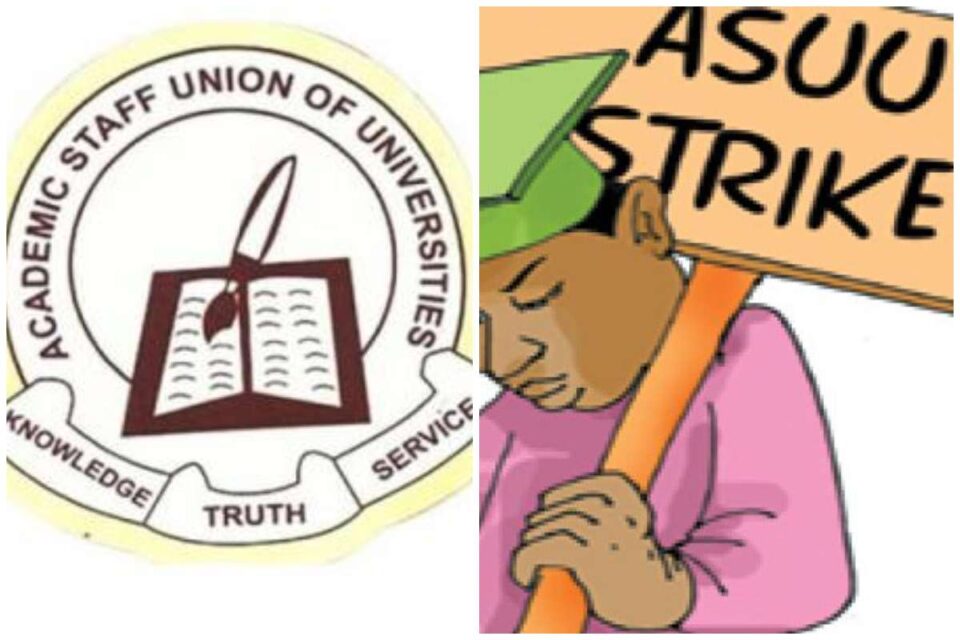Discussing the issue of industrial action embarked upon by the Academic Staff Union of Universities (ASUU), is like regurgitating a broken record in Nigeria. Hardly would any two academic sessions end without the body of academics calling out its members from the classrooms in the nation’s universities. Almost similar pattern is replicated by the Academic Staff Union of Polytechnics (ASUP). They share a common problem: the I-don’t-care attitude of people in top echelons of government to the decadent situations, both human and infrastructure, in the nation’s public academic institutions.
Put in proper context, ASUU is aggrieved over government’s continued non-implementation of its demand since 2009. Specifically, the lecturers are asking for the revitalisation of public universities. They are also asking government to put in place adequate infrastructure in the classrooms and hostels (including rehabilitation and construction of new ones). They are asking to be paid their earned academic allowances as well as for improved funding of state universities.
Aside the above issues, ASUU is asking the federal government to replace the Integrated Personnel Payroll Information System (IPPIS) with its University Transparency and Accountability Solution (UTAS) in the payment of emolument to its member. The preference for UTAS to IPPIS, ASUU insists, stemmed from the fraud they claim is associated with the IPPIS, saying that over time some of their members had been paid less than 10 per cent of their monthly emolument due to tampering with the IPPIS configurations by some unscrupulous civil servants, possibly in connivance with some top but powerful personalities.
It was the several but failed attempts to get the federal government to address the issues that have led to the recurrent industrial action. ASUU is insisting that it was compelled to proceed on the current Valentine’s Day (February 14, 2023) month-old warning strike because the President Muhammadu Buhari’s administration has since its inception in 2015, demonstrated unseriousness, insincerity and contemptuous disregard for the implementation of the Memorandum of Understanding (MoU) and Memorandum of Action (MoA) reached and signed with the union.
As things stand now, the over 100 public universities in the country with student population of about two million are at a standstill. This army of Nigerian students are at home, lazing about, roaming the streets, doing nothing. It is due to no fault of theirs that they are not in their classrooms; neither is it the making of their parents, having paid their school fees. They are at home due mainly to the non-challant attitude of our public officials, several of who see themselves as demi-gods.
In announcing the current “Valentine’s Day strike”, ASUU President, Prof. Emmanuel Osodeke, said the industrial action, is “comprehensive and total”. According to him, “we don’t like to see our students at home. We don’t want our academic calendars disrupted, but our demands are not met”.
For over two weeks since then, ASUU has been on strike and the much Nigerians heard from the federal government was the Minister of Education, Adamu Adamu saying he was not aware that ASUU downed tools. Is this not disturbing, coming from a minister superintending over the affairs of our young children? The Minister said he had travelled to Germany on medical tourism, only to be informed that the university teachers have gone on strike. If he had reposed any confidence on the quality of healthcare in the country, would he have travelled abroad to seek medication?
Equally, the Minister of Labour and Employment, Dr. Chris Ngige, had expressed surprise that the lecturers were embarking on strike. Recall that in 2020, ASUU had embarked on a nine-month strike over the government’s failure to honour this same deal. The lecturers, however, suspended the strike after series of meetings with the federal government.
Following the suspension, Ngige, had vowed not to allow the lecturers to go on strike again. He had said: “I will not give ASUU the opportunity to go on strike because I have three biological children that suffered from this imbroglio that we found ourselves in and about 15 people on my scholarship in Nigerian universities”.
Notwithstanding making such committal statement, in November last year, ASUU issued a three-week ultimatum over the poor handling of the MoA it had signed with government. This made no meaning to Adamu and Ngige, including other top portfolio managers in the Executive and Legislative Arms of government. They none the less allowed the lecturers to rescind the suspended strike.
It is important at this juncture to reiterate that the demands of ASUU, which have been recurring since the 2009 FG-ASUU collective agreements centre on adequate funding and revitalization of public universities, university autonomy and payment of the legitimate entitlements and welfare due to university lecturers.
Minister of Education, Adamu, had attempted to absolve the federal government of blame on the strike accusing the lecturers of downing tools at a time government was attending to their demands. He said at the Presidential Villa: “Unfortunately, they have gone on strike and I am looking for them because all the issues are being addressed. The last thing that happened was that our committee looked at their demands. But there are re-negotiations going on. The federal government is ready to meet them on all issues they have raised, I think it’s not the fault of the government. That is why I said that I am surprised that ASUU has gone on strike.”
On his part, President of the Nigeria Labour Congress (NLC), Ayuba Wabba, urged the federal government to resume negotiation with ASUU and sign the re-negotiated agreement. He further urged President Buhari and relevant Ministries, Departments and Agencies (MDAs) to immediately discharge their responsibilities and bring the stalemate to an end.
The AUTHORITY would however like to pose the following questions: What punishments did the federal government met out to the public officers who had made it impossible to implement the negotiated and renegotiated agreements, including the MoU and MoA? Is it possible that since most children of the privileged Nigerians study abroad, it does not matter even if all the public universities are shut down? Can the federal government unveil the ownership of private universities in the country? Would it be appropriate that serving ministers could claim they are not aware that agreements they appended their signatures to have not been implemented?
We make bold to state that the attitude of our public officials to the goings-on in our public institutions are less than satisfactory. It is unfortunate because almost all the personalities occupying sensitive public portfolio in the country not only benefitted from public scholarships, but attended public universities here in Nigeria. They enjoyed all forms of bursary and had good time while in the university. Why they preten that all is well in our public universities befuddle any right-thinking person.
Just as insurgency and criminality are gradually engulfing the nation due primarily to the non-challant approach to duty of our security operatives and their supervisors, so would the ill-effects of this I-don’t-care-less attitude to the debilitating issues affecting our public educational institutions like Jonah in the belly of the whale. And unfortunately, such unfortunate scenario is almost engulfing us like an octopus. The earlier we realize that our selfish approach to issues can only emasculate everybody, the better for all of us. It is no longer a matter of buck passing or denials we must face the reality and quickly resolve the issues and get our children back to the classrooms. Not doing so is a recipe for anarchy.



